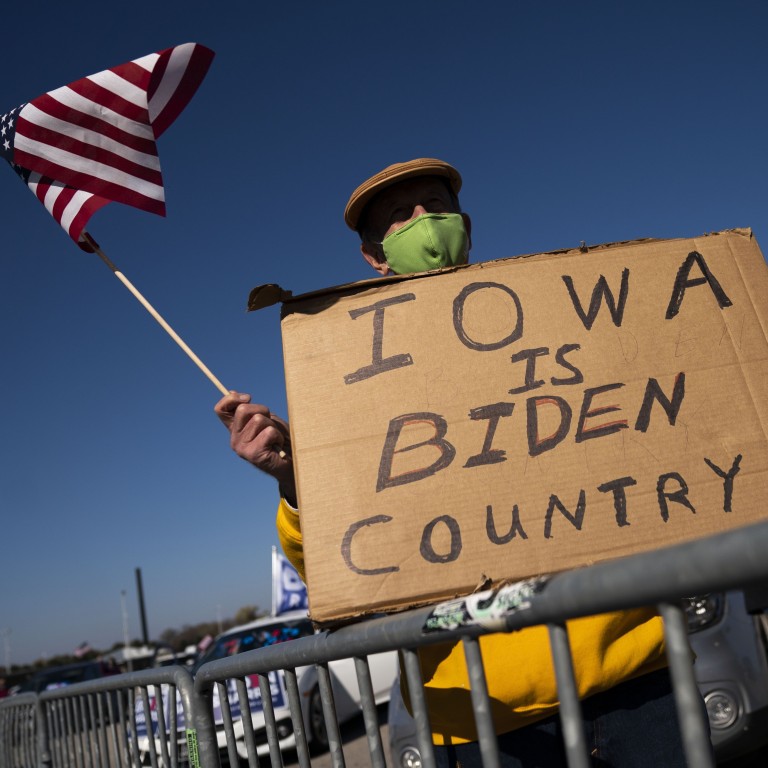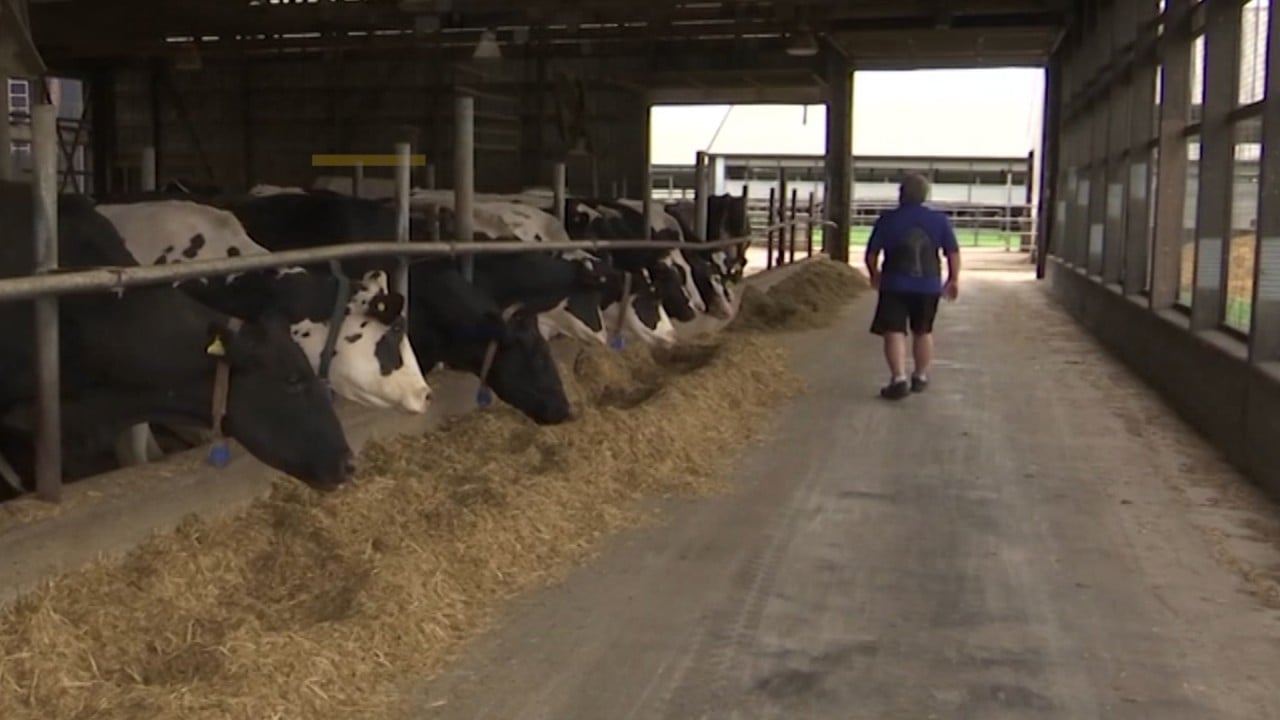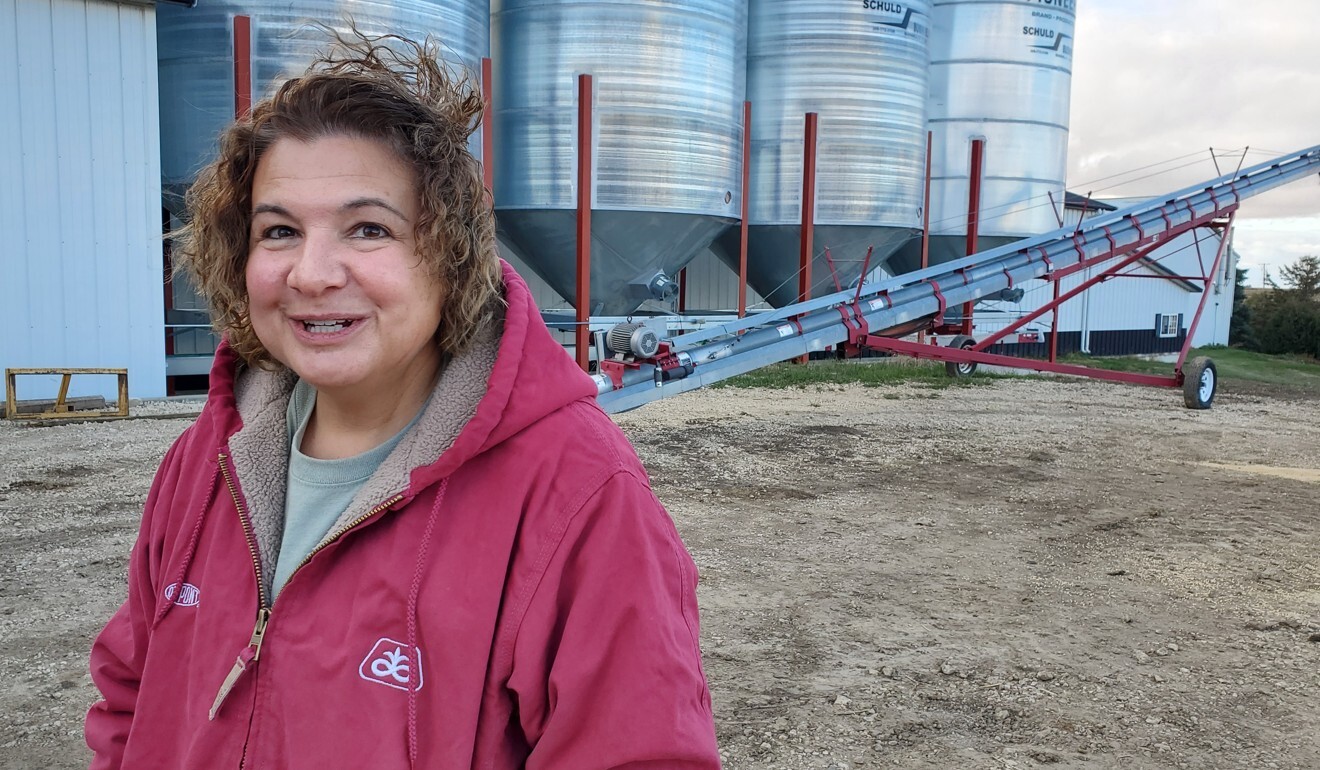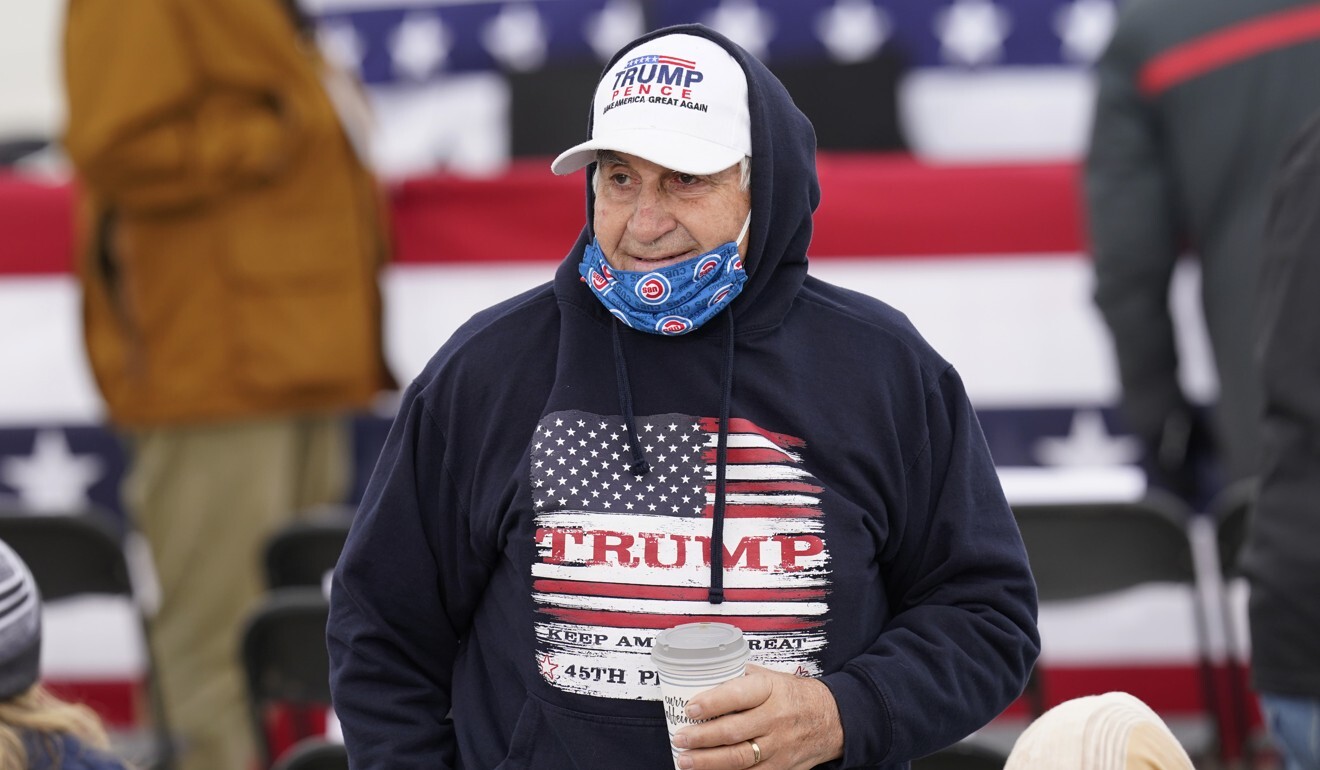
US election: Battleground state of Iowa weighs trade war tariff pain against Donald Trump bailout gain
- Small farms, local factories, farm equipment sellers and retailers ineligible for a federal bailout have been hit hard, undercutting some of Trump’s support
- ‘The tariffs hit me right in the stomach. But between the trade deficit and intellectual property theft … this isn’t fair,’ says a sixth-generation Iowa farmer
Suzanne Shirbroun bounds up the five steps of her oversized, climate-controlled, stereo-equipped tractor and gazes out at her fields of soy and corn. Three-quarters of the harvest is in and, if the snows hold off, the rest will land by early November. Despite taking a huge hit from the US-China trade war, she also hopes Iowa and the nation will land a victory for President Donald Trump on Tuesday.
“This administration has come through for us,” she added. “In every war there are casualties, and I just hope we’re not one.”
As Americans vote in the most contentious presidential election in memory, amid volatile commodity prices and Trump’s still unfulfilled pledge to “reshore” US factory jobs, this Midwestern farm state has emerged as a key battleground.
Trump won Iowa handily in 2016, but polls show a toss-up this year as he, Vice-President Mike Pence and Democratic challenger Joe Biden descend on the state in the final days to make their case.
Iowa tends to run conservative, with farm issues front and centre befitting its deep ties to the land. Senator Joni Ernst – a Republican elected six years ago after a TV advertisement showing her castrating hogs and a pledge to “make ’em squeal” in Washington – has seen her re-election prospects weaken after flubbing a recent debate question on soybean prices.
But the state also likes a maverick. It voted for president Barack Obama twice before it went with Trump, with rural Howard county here in northeast Iowa recording a 40 percentage point swing from Democrat to Republican in 2016, among the nation’s largest.
The contrast between the local Trump and Biden campaigns could hardly be starker in a county with a population of roughly 9,000, including 6,295 registered voters. Trump organisers have distributed a record number of “Trump Pence” yard signs and the larger barn signs, held high-profile fundraisers and a “ranger ride” parade of hundreds of honking vehicles decorated with Trump flags, banners and hats.
“The ride, that was phenomenal,” said Neil Shaffer, a farmer, conservation officer and the Republican county chairman, wearing a “Pheasants Forever” hat.
Trump tells US farmers China deal will open door to big exports
His counterpart, Laura Hubka, Howard’s Democratic chair, has settled on something close to a stealth campaign, holding public events if asked, which are rare and poorly attended, handing out the occasional sign and waiting for people to call her.
“I get the eye from a lot of people, but I say, you understand how I feel,” she said. “They know who I am and where to find me.”
Recently, Hubka said that she delivered a Biden yard sign to a farmer and that four of his friends were there who also leaned toward the Democrat. She said she asked them if they wanted a Biden sign and their response was: “Oh my God, no. No way I want to tell anyone.”

01:47
US farmers brace for more pain as China halts US agricultural imports amid escalating trade war
Hubka, a healthcare worker and US Navy veteran, said she would be surprised if the county flips for Biden, and she is planning a Zoom vigil on Tuesday that she has dubbed her “election night therapy session”.
Gary Gassett, who’s retired on his 160-acre family farm, said he was voting for Biden after leaning Republican most of his life because he thinks Trump has undercut long-standing conservative values. Tariffs are a blunt tool that ultimately hurts US consumers, and Trump’s trade policies have made farming increasingly dependent on government handouts instead of building markets.
“The president has falsely claimed that China paid for the tariffs,” Gassett said. “Anyone who understands economics knows that’s not true.”

Locals on both sides of the political divide acknowledge the crippling damage of the two-year US-China trade war on the local and regional economy. But the pain has started to ease in time for the election, helped by a massive bailout Trump authorised for largely Republican farm states. This multi-year subsidy could reach US$46 billion, including some 40 per cent of total farm income this year, according to the University of Missouri’s Food and Agricultural Policy Research Institute.
“It would’ve been an unmitigated disaster for Trump without that, given the damage seen to big parts of the farm economy,” said David Peterson, a political science professor at Iowa State University, adding that more farmers statewide are questioning whether it was all worth it. “This is a conservative state. You don’t go into farming to take government money.”
Also helping Trump here are corn and soybean prices, which are rising after past lows fuelled by returning Chinese buyers under the phase one deal. “I have 160 acres and we’ll end up with about US$18,000 in payments this year,” said Shaffer. “And yesterday, soy was US$10.04 a bushel versus US$8 last year, plus we’re getting much greater yields. Trump’s been a win-win.”
Trump hints at more aid as US farmers suffer trade war ‘body blow’
Smaller farms, local factories, John Deere farm equipment sellers and retailers ineligible for the bailout, have also been hit hard, undercutting Trump’s support in Iowa. Charles Wang, president of the Des Moines, Iowa-based Ten Square International, saw his farm machinery exports to China fall 50 per cent as the trade war escalated.
“So without any change to the machine, not even its colour or function, a US$100,000 machine becomes US$140,000,” said Wang. “We’re just hanging on and trying to keep afloat. It’s tough.”
US farm exports to China fell from US$15.8 billion in 2017 to US$5.9 billion in 2018 and US$13.8 billion last year, according to the US International Trade Administration. Iowa farmers and local residents acknowledge that the long-term market damage could be substantial now that Beijing has turned to Brazil, Ukraine and elsewhere to replace US exports.
“This is going to kill the market going ahead as other countries supply more,” said Hubka. “I think it’s really going to kick us in the ass.”
So far this year, Iowa has sold 1.3 billion bushels of soy to China, up from 342 million.
“So we’re up, but not as high as 2016 and 2017,” said Grant Kimberley, marketing director with the Iowa Soybean Association.
Trump-Biden final debate offers some pointers for US policy in Asia
Despite the importance of its markets, many local farmers voice suspicion of China. “You can’t trust them,” said Aaron Schatz, 37, a fifth-generation farmer in Howard county, which despite its small size produced Nobel Peace Prize winner Norman Borlaug and Ellen Church, reportedly the world’s first stewardess. “It feels like Trump is going to keep them on their toes.”
China’s reputation wasn’t helped by a local brush with intellectual theft. In 2016, Chinese national Mo Hailong was sentenced to three years in prison and another three of supervised release. He also forfeited two farms after admitting he conspired to steal patented genetically modified corn seeds produced by DuPont Pioneer and Monsanto for shipment to China. A member of the group was discovered digging in an Iowa field. By the time the FBI caught up with them, Mo was the only one in the US, with another six reportedly back in China.

“They were caught a couple hours south of here,” said Shirbroun, a trained agronomist who runs a Pioneer seed dealership on the side.
As Shirbroun finished preparing a chicken casserole for dinner, she reflected on the past few years of trade wars, Covid-19, African swine fever and a nasty windstorm that battered corn yields. She still hopes that all three of her sons will join the family business even as her 80-year-old father “dials back” to a mere 12-hour workday.
“Farming is a marathon, not a sprint. Some years are phenomenal, some years just suck,” she said. “So you farm for the average. But you don’t like three bad years in a row.”

